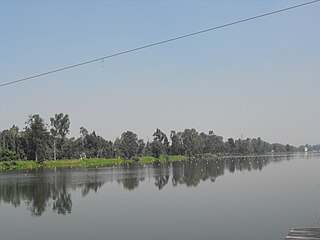The men's K-1 1000 metres event was an individual kayaking event conducted as part of the Canoeing at the 1964 Summer Olympics programme on Lake Sagami, Japan.
The men's K-2 1000 metres event was a pairs kayaking event conducted as part of the Canoeing at the 1964 Summer Olympics programme on Lake Sagami, Japan.
The men's K-4 1000 metres event was a fours kayaking event conducted as part of the Canoeing at the 1964 Summer Olympics programme on Lake Sagami, Japan. This event debuted at these games and is only one of two events that has been at every ICF Canoe Sprint World Championships.

The men's sprint was a track cycling event held as part of the Cycling at the 1964 Summer Olympics programme. It was held on 17 and 18 October 1964 at the Hachioji Velodrome. 39 cyclists from 22 nations competed. Nations were limited to two cyclists each. The event was won by Giovanni Pettenella of Italy, the nation's second consecutive and fourth overall victory in the men's sprint. Sergio Bianchetto took silver, making it the second consecutive Games in which Italy had two men on the podium in the event. It was also the fifth straight Games with Italy taking at least silver. Daniel Morelon of France took bronze, the first of his record four medals in the event.

The men's coxed pair event was a rowing event conducted as part of the 1964 Summer Olympics programme. It was held from 11 to 15 October. There were 16 boats from 16 nations, with each nation limited to a single boat in the event. The event was won by American crew Edward Ferry, Conn Findlay, and coxswain Kent Mitchell. Findlay had been on the United States gold medal crew in 1956 and bronze medal crew in 1960; he was the first man to earn two gold medals in the event, as well as the first man to win three medals of any color in the event. Mitchell had also been on the 1960 crew, and was the seventh man to earn multiple medals in the coxed pair. Jacques Morel, Georges Morel, and cox Jean-Claude Darouy took silver to earn France's first medal in the event since 1952. Herman Rouwé, Erik Hartsuiker, Jan Just Bos earned what was formally the Netherlands' first medal in the event; a pair of Dutch rowers had won the first edition in 1900, but had jettisoned their cox in favor of a local French boy between rounds and thus that medal was a "mixed team" medal.

The men's coxed four event was a rowing event conducted as part of the Rowing at the 1964 Summer Olympics programme. It was held from 11 to 15 October. There were 16 boats from 16 nations, with each nation limited to a single boat in the event. The event was won by the United Team of Germany, the nation's second consecutive victory in the men's coxed four. The two medals placed the United Team of Germany in a tie for second-most all-time with Switzerland and Italy; Germany had the most with four. Italy earned its third straight medal in the event, all of different colours, with a silver in Tokyo. The bronze medal went to the Netherlands, the nation's first medal in the event since 1900.

The men's eight event was a rowing event conducted as part of the 1964 Summer Olympics programme. It was held from 12 to 15 October at the Toda Rowing Course. There were 14 boats from 14 nations, with each nation limited to a single boat in the event. The event was won by the United States, returning the top of the podium after losing their eight-Games winning streak with a fifth-place finish in 1960; it was the nation's 11th overall victory in the men's eight. The defending champions, the United Team of Germany, took silver; the Germans defeated the United States in the opening round but lost the rematch in the final after the Americans advanced through the repechage. Czechoslovakia repeated as bronze medalists.
The men's sprint at the 1976 Summer Olympics in Montreal, Canada, was held from 21 to 24 July 1976. There were 25 participants from 25 nations. Following the explosion in size of the event from 1960 to 1972 when nations were allowed two cyclists each, the limit was again reduced to one competitor from each nation. The event was won by Anton Tkáč of Czechoslovakia, the nation's first medal in the men's sprint. Tkáč beat two-time defending champion Daniel Morelon of France in the final; Morelon's silver was a (still-standing record fourth medal in the event. Jürgen Geschke earned bronze to give East Germany its first medal in the event and the first medal for any German cyclist since 1952.

The men's K-1 1000 metres event was an individual kayaking event conducted as part of the Canoeing at the 1960 Summer Olympics.
The men's C-1 1000 metres event was an open-style, individual canoeing event conducted as part of the Canoeing at the 1972 Summer Olympics program.
The men's K-1 1000 metres event was an individual kayaking event conducted as part of the Canoeing at the 1996 Summer Olympics program.

The men's eight competition at the 1972 Summer Olympics in Munich took place from 27 August to 2 September at the Olympic Reggatta Course in Oberschleißheim. There were 15 boats from 15 nations, with each nation limited to a single boat in the event. The event was won by New Zealand, the nation's first medal in the men's eight. Silver went to the United States. East Germany also earned its first medal in the event, with bronze.

The men's single sculls competition at the 1968 Summer Olympics took place at Virgilio Uribe Rowing and Canoeing Course, Mexico. The event was held from 15 to 19 October. There were 17 competitors from 17 nations, with each nation limited to a single boat in the event. The event was won by Jan Wienese of the Netherlands, with Jochen Meißner of West Germany taking silver and Alberto Demiddi of Argentina earning bronze. It was the first medal in men's single sculls for each of the three nations. The Soviet Union's four-Games winning streak in the event ended; three-time champion Vyacheslav Ivanov was left off the team in favor of Viktor Melnikov; Melnikov finished fourth in his semifinal and did not reach the main final.

The men's sprint at the 1960 Summer Olympics in Rome, Italy was held on 26 to 29 August 1960. There were 30 participants from 18 nations. For the first time since 1924, nations were allowed to have more than one competitor each ; for the first time since 1924, one nation took multiple medals. Italians Sante Gaiardoni and Valentino Gasparella won gold and bronze, giving Italy a four-Games podium streak with three total gold medals—second all-time behind France's five. Leo Sterckx's silver was Belgium's first medal in the men's sprint.

The men's sprint at the 1972 Summer Olympics in Munich, West Germany, was held on 1 to 2 September 1972. There were 51 entrants from 30 nations; 5 withdrawals left 46 competitors from 27 nations. Nations were limited to two cyclists each. The event was won by Daniel Morelon of France, successfully defending his 1968 title and becoming the first man to win three medals in the event. It was France's seventh gold medal in the event, most in the world. Silver went to John Nicholson of Australia, taking the nation's first medal in the men's sprint since 1956. Omar Pkhakadze, who had finished fourth in 1968, won the bronze this time for the Soviet Union's first medal in the event. Italy's six-Games medal streak was broken.

The men's coxed four competition at the 1968 Summer Olympics took place at Virgilio Uribe Rowing and Canoeing Course, Mexico City, Mexico. It was held from 13 to 19 October and was unexpectedly won by the team from New Zealand, which secured the country its first Olympic rowing gold medal. Thirteen teams from 13 nations attended the competition. East Germany earned its first medal in its debut in the event, taking silver. Switzerland took bronze, its first medal in the men's coxed four since 1952.
The men's coxless pair competition at the 1960 Summer Olympics took place at took place at Lake Albano, Italy.

The men's coxed four competition at the 1960 Summer Olympics took place at Lake Albano, Italy. It was held from 31 August to 3 September. There were 21 boats from 21 nations, with each nation limited to a single boat in the competition. The event was won by the United Team of Germany in its debut in the event. Silver went to the French crew, the nation's first medal in the event since 1936. The defending champions Italy received bronze this time. In an event which saw constant turnover even from consistently strong nations, three members of the Italian team returned from the 1956 gold-medal crew to earn a second medal this Games: Romano Sgheiz, Ivo Stefanoni, and Franco Trincavelli were only the 2nd, 3rd, and 4th men to earn multiple medals in the coxed four.

The men's eight competition at the 1960 Summer Olympics took place at took place at Lake Albano, Italy. It was held from 31 August to 3 September. There were 14 boats from 14 nations, with each nation limited to a single boat in the event. The event was won by the United Team of Germany in that combined team's debut; it was the first medal for any German team since the 1936 Games in Berlin and first-ever gold medal in the event for a German team. Canada repeated as silver medalists. Czechoslovakia won its first men's eight medal with a bronze. The United States, which had won the last eight times the event was held and all ten times the nation had appeared before, lost for the first time—finishing fifth, off the podium entirely, despite being among the contenders once again.

The men's coxed pair competition at the 1968 Summer Olympics took place at Virgilio Uribe Rowing and Canoeing Course, in the Xochimilco borough of Mexico City. It was held from 13 to 19 October. There were 18 boats from 18 nations, with each nation limited to a single boat in the event. The event was won by the Italian crew, rowers Primo Baran and Renzo Sambo and coxswain Bruno Cipolla; it was Italy's first victory in the event since 1920 and second overall. The Netherlands made the podium for the second consecutive Games, though with an all-new team: Herman Suselbeek, Hadriaan van Nes, and cox Roderick Rijnders took silver. A Danish boat medaled in the event for the first time since 1952, with Jørn Krab, Harry Jørgensen, and Preben Krab earning bronze. The American medal streak of three Games ended with the United States boat placing fifth.












